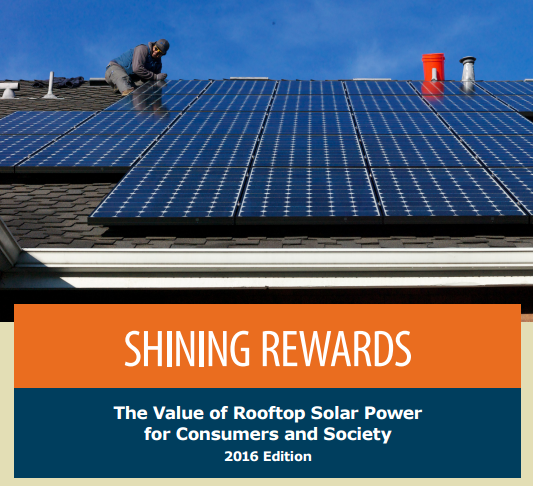Gideon Weissman
Former Policy Analyst, Frontier Group
The vast majority of the 16 recent solar cost-benefit analyses we reviewed for Shining Rewards found that, even with full retail net metering, solar owners provide a net benefit to the grid. And the analyses finding otherwise were largely commissioned by utilities.
Former Policy Analyst, Frontier Group

The rooftop solar boom over the last decade has taken the country by storm. One million solar installations are now reducing fossil fuel pollution equivalent to taking 2 million cars off the road.
But the growth of rooftop solar has alarmed some of America’s electric utilities, some of which have launched attacks on policies to encourage rooftop solar – particularly net metering, which typically lets solar owners sell the excess electricity they generate at the retail rate of electricity. These attacks, through PR campaigns and utility commission testimony, often argue that net metering constitutes a subsidy from electric ratepayers to solar owners.
In our newly released report Shining Rewards (an update to last year’s report of the same name), we find that this utility argument is likely a false one. The vast majority of the 16 recent solar cost-benefit analyses we reviewed for the report found that, even with full retail net metering, solar owners provide a net benefit to the grid. And the analyses finding otherwise were largely commissioned by utilities.
Solar energy, according to these analyses, brings significant benefits to ratepayers. These include reducing expensive transmission losses, reducing the need for new power plant capacity, and avoiding certain environmental compliance costs.
But the main benefit of solar energy is that it is an indispensable tool for preventing the worst impacts of global warming, including rising seas, extreme weather, damage to agriculture, and more. Rooftop solar power is fast to build, doesn’t take up new land, and lets conscious consumers take emission reductions into their own hands. It also builds momentum for clean energy by putting it right into our communities. And, as many of these studies show, solar energy also puts us on the road to a better, stronger, more efficient grid.
We have enough evidence to know that rooftop solar energy – and good policy to support it – isn’t just a good idea for taking on global warming, but also brings lots of other big benefits to the rest of society (a conclusion that was also recently found by Brookings). Solar energy is popular, rapidly coming down in price, and good for our planet and our communities. We should continue the policies that support its adoption, and that can help speed our transition to a clean energy future.
Former Policy Analyst, Frontier Group
